annual report1-final.qxd - Overseas Indian
annual report1-final.qxd - Overseas Indian
annual report1-final.qxd - Overseas Indian
You also want an ePaper? Increase the reach of your titles
YUMPU automatically turns print PDFs into web optimized ePapers that Google loves.
Pravasi Bharatiya Divas<br />
Pravasi Bharatiya Divas<br />
Pravasi Bharatiya Divas<br />
Pravasi Bharatiya Divas<br />
where the MOIA could take action and do something<br />
related to that. Firstly, there should be an effective network<br />
of younger PIO leaders below 40 years. Secondly,<br />
there should be a strengthening of network of ministers<br />
of PIO around the world not only focusing on India but<br />
on parliamentarians across the world. Thirdly, there<br />
should be sustainability of the parallel process of PIO<br />
members of parliament held at PBD 2003.<br />
Baleswar Agarwal, in his turn, talked about the parliamentarian<br />
conferences, the first one of which took<br />
place in November 1998 and which was inaugurated<br />
by then Prime Minister, Atal Bihari Vajpayee. The second<br />
one was inaugurated by the Vice-President<br />
Bhairon Singh Shekhawat. Around 300 parliamentarians<br />
participated in these conferences. It was high<br />
time for the diaspora to join hands, he said.<br />
Velupali Raju from Reunion Island started by<br />
talking about his island country and the geographical<br />
distance from major cities. He pointed out that<br />
Reunion had a large <strong>Indian</strong> population, many coming<br />
from Pondicherry and erstwhile French territories<br />
in India as well as traders from Gujarat and<br />
other parts of India. It was an island with many<br />
civilisations of the world living together. It had borrowed<br />
spirituality from India, he said.<br />
J.C. Sharma, in his speech, opined that the most<br />
important aspect of the <strong>Indian</strong> diaspora was its<br />
dynamics. The diaspora was so varied and different<br />
that the nature of discourse also was varied. He<br />
gave the examples of <strong>Indian</strong>s in Fiji, South Africa,<br />
and Mauritius. He argued that one could not keep<br />
politics ethnicity-based, otherwise it would lead to<br />
instability, mutual suspicion, and unrest. Hence,<br />
the nature of discourse should be made inclusive.<br />
Finally, he stated that voting rights was a complex<br />
issue and had to be considered very carefully.<br />
In the end, after comments from the audience, a<br />
resolution was passed, which was drafted by the<br />
South African delegation and read by the Chair, Ms.<br />
Shashi Uban Tripathi. It read: “We hereby call upon<br />
all Pravasis, democratic peace loving people in the<br />
world, and the international agencies, and the social<br />
forces to give support to this programme of PBD celebrations<br />
to commemorate the 100 years anniversary<br />
of Satyagraha. In noting further the philosophy<br />
of Satyagraha arose from the special experiences of<br />
Gandhiji in South Africa and India against racism.<br />
Here we call upon both the Governments and people<br />
of both India and South Africa to lead this international<br />
programme of celebration activities to commemorate<br />
the 100 years of Satyagraha.”<br />
Panelists at the panel discussion on ‘Reporting on the Diaspora’ in<br />
Hyderabad on January 9, 2006.<br />
Chair:<br />
Speakers:<br />
Panel Discussion II: Reporting on the Diaspora<br />
Dr. Sanjaya Baru,<br />
Media Adviser to PM<br />
Paras Ramoutar<br />
Chidanand Rajghatta<br />
Sreenath Sreenivasan<br />
Raju Narisetti<br />
Ramesh Japra<br />
Neena Gopal<br />
Shubha Singh<br />
The discussion was initiated by Dr. Sanjaya Baru,<br />
Media Adviser to the Prime Minister. In his opening<br />
remarks, the Chairman spelt out the interest of<br />
the MOIA in networking with the people of <strong>Indian</strong><br />
origin through the media. He said that it was<br />
essential to understand what common interests<br />
bound the diversities of the <strong>Indian</strong> diaspora.<br />
The first speaker, Neena Gopal, a journalist from<br />
UAE, made a comparison between the media in<br />
UAE and India. In UAE, the media was<br />
approached by people having problems, whereas<br />
in India, the media had to approach people to find<br />
out their problems. She said that the views of the<br />
media were taken into account by the UAE<br />
43


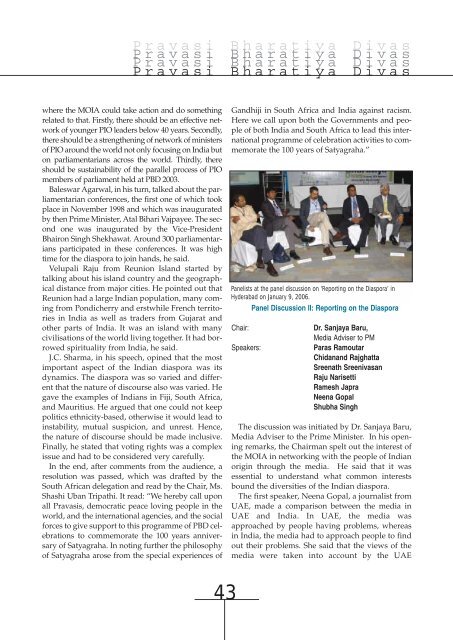
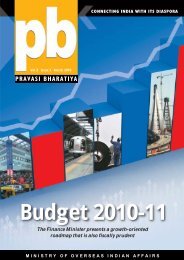
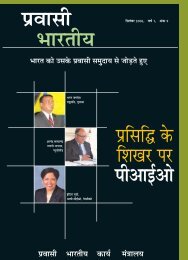

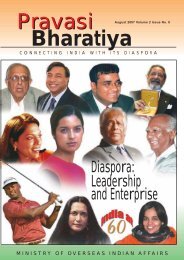
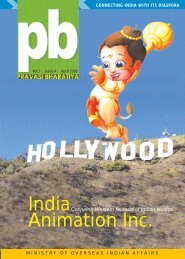
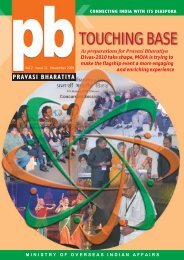
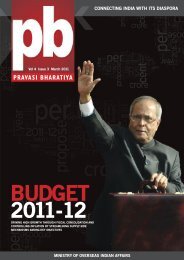
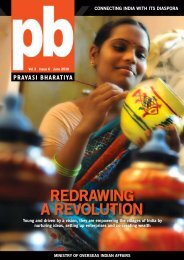
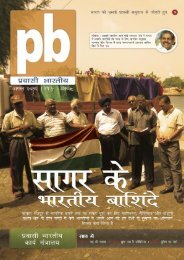

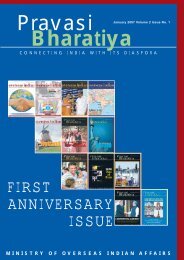
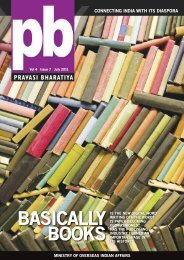
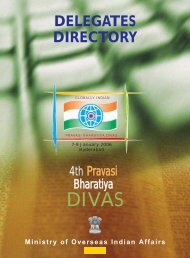
![flaxkiqj feuh izoklh Hkkjrh; fnol] vDVwcj 9&11 - Overseas Indian](https://img.yumpu.com/43977040/1/184x260/flaxkiqj-feuh-izoklh-hkkjrh-fnol-vdvwcj-911-overseas-indian.jpg?quality=85)
